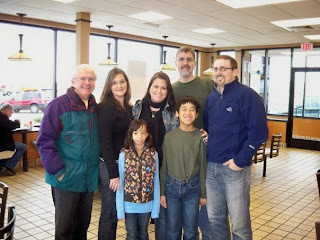It is difficult to understate the influence of people of
character. I know that I am influenced
by some people in ways I can not articulate.
My interactions with these people change me profoundly without my
conscious awareness. Only when I sit
quietly to reflect on one of these relationships does the impact really become
clear. There are people who inspire me
to compassion or honesty or humility or faithfulness. Others inspire diligence or commitment or joy
or optimism. My father-in-law, John
Urheim, inspires nobility and courage.
It is really impossible for me to truly communicate the influence John
has had on me. I don’t know that I have
met anyone who, upon deciding upon a good course of action, a right course of
action, has more single-mindedly responded with determination and courage than
my father-in-law John. Knowing John
makes me want to do the right thing by people, and to do it with unwavering
commitment.
In the context of our relationship, the defining chapter of
John’s character was written when he married Yvonne and became a step-father to
Whitney and Carrie. Less than a year
after this happy event, Yvonne contracted cancer and died leaving John broken-hearted
and alone with two little girls. John
responded the way that he does -- he decided to do the best for Whitney and
Carrie and to do it with all his energy.
He formally adopted them and committed himself to protect and provide
for them with the determination and resolve which undoubtedly characterize his
person.
Several years later, I had the good fortune of falling in
love with John’s little girl, Carrie. I,
of course, had no indication how John would influence me, but over time I came
to see how John lived, how he made decisions, and how he committed himself to those
he loved. By the time I came to know
John, he had remarried, and I have watched John live respectfully, joyfully and
lovingly with Maxine for over twenty years. As part of John's family, I have watched him be a committed friend and a loving Grandfather. I have seen him overcome personal challenges with patience and grace.
 John has been the center of the Urheim family, a collection of
people with no biological connectivity save the full-sib relationship of Carrie
and Whit. It has been so appropriate for
us to be strung together by the magnanimity of John’s loving character. Like John, I have no biological offspring,
and like John, my family was expanded through adoption. I only hope that like John, my parenting will
be hallmarked by courage and commitment and the resolve to do what is right.
John has been the center of the Urheim family, a collection of
people with no biological connectivity save the full-sib relationship of Carrie
and Whit. It has been so appropriate for
us to be strung together by the magnanimity of John’s loving character. Like John, I have no biological offspring,
and like John, my family was expanded through adoption. I only hope that like John, my parenting will
be hallmarked by courage and commitment and the resolve to do what is right.
Grateful for my Father-in-law, John Urheim.
_______________
“Then I thought,
‘I shall die in my nest, and I shall multiply my days as the sand,
My roots
spread out to the waters, with dew all night on my branches,
My glory
fresh with me, and my bow ever new in my hand.’
Men listened
to me and waited and kept silence for my counsel.
After I
spoke they did not speak again, and my word dropped upon them.
They waited
for me as for the rain, and they opened their mouths as for the spring rain.
I smiled on
them when they had no confidence, and the light of my face they did not cast
down.”
Job 29:21-24




